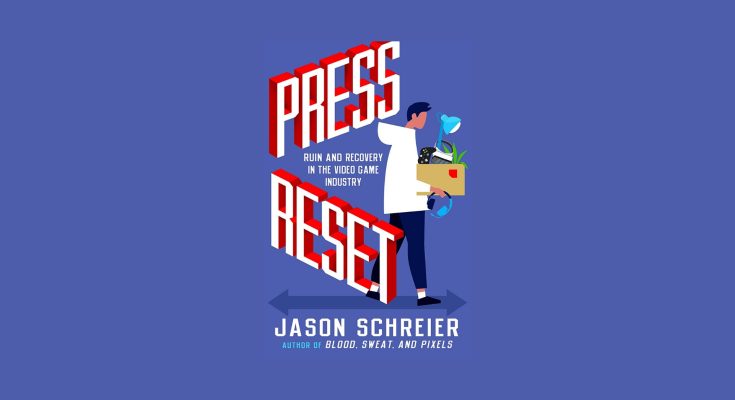A thoughtful look at a volatile industry
For all its popularity, the video game industry is certainly misunderstood. In 2020, video games rated in a $ 180 billion estimated– More than Hollywood and North American Sports Combined. However, while millions of players meet happily in virtual worlds, there is a much darker underlying current, many of these successful games. And it’s a crunchy story at work, mass dismissals and constant volatility.
In Press reset: ruin and recovery in the video game industryinvestigative journalist and Blood, sweat and pixels The author Jason Schreier addresses this story in ruthless detail. The book, which will be released on May 11, 2021 via Grand Central Publishing, offers first -person accounts of game developers affected by irrational game layoffs (Bioshock), 38 studios (Kingdoms of Amalur: Reminder), Visceral games (Dead space), and other high -level studios.
More than nine chapters, Press reset Chronicle these developers – their careers, their successes and their setbacks – and the studio closures that bind their stories. Along the way, Schreier exposes many of the systemic problems behind these closures, from poor management to the greed of companies.
Press reset Ask some important questions: What is the next step for these developers? For industry as a whole? In his search for answers, Schreier returns to the same central thesis: the game industry is fundamentally broken and needs to fix.
The perspectives may seem dreary, but Schreier puts on the needle in a way that is equal attractive and informative. It is a convincing literature and an essential reading for those who care about the hobby of the video game.
The reality of game development
In 2017 Blood, sweat and pixelsSchreier underlined the myriads of challenges that game developers faced when creating popular video games. From absurd office policy to paralyzing technological problems, it is a small miracle that these games come out at all – the only ones are fun.
Four years removed, all of this is always true. The games remain incredibly difficult to design, and development always revolves around a nasty culture of “Crunch”. Rather than focusing on the games themselves, Press reset Focus on people behind the games – and the studios that would eventually let these people leave.
The opening chapter follows the career of Warren Spector, a veteran of the industry announced for his work on Deus ex And System shock. Another details the faces behind the irrational games, the Boston studio now flood Bioshock And Bioshock Infini. The book even highlights people who are not at all game developers – like Curt Schilling, the legendary baseball launcher who led the 38 Rhode Island studios in the ground.
Each of these stories is distinct, taking place in various states or countries, often with completely different take -out dishes. The Schilling saga, for example, tells a story of pride, sumptuous benefits and bad funding. The irrational history, on the other hand, details the uncontrolled creative power of the chief of studio Ken Levine – and the toxic culture which he perpetuated accordingly.
Pick up the parts
Also distinct, these chapters are always engaging thanks to the catchy comment of Schreier and demanding research. While studio stories would work fairly well as autonomous cases, Schreier skillfully flows from one to the other. The story of irrational, for example, is gently in a chapter of his less known sister studio, 2K sailor (Bioshock 2).
Whenever the real world protagonists of Press reset Faced with adversity, like a studio stop, Schreier gives an overview of what is happening next. Sometimes people collect the pieces and start again. Others, frustrated or exhausted, completely leave the industry.
In addition, the personalities who appear in a good place in a story tend to return to another. Developers who have been dismissed can find work across the country, uproot and uproot themselves and their families, to find themselves again. Other developers may decide to join their forces and train their own independent studio.
Although these moments highlight the “Buddy-Buddy” atmosphere in the game industry, they also serve to illustrate the constant volatility that game developers are confronted during their career. By detailing these moments which change life, Schreier aims at the system as a whole, from the establishment of unrealistic objectives to the salaries of stratospheric frameworks. It leaves readers with several possible solutions for the way to follow – as unionization—Ol with a powerful call for action to challenge the status quo.
Final reflections
Press reset is a stimulating reading, and a welcome follow -up of the first title of Jason Schreier. Those who know Blood, sweat and pixels or Schreier’s work at Kotaku And Bloomberg News Will already be used to his meticulous style, but even new readers should find the equipment of the book accessible and engaging.
The constant introduction of developer and studio names could repel those who do not know the game industry – without danger people who benefit the most from the reading of this book. Fortunately, Blood, sweat and pixels provides an excellent primer to the terminology of Press resetFor those who wish to pre-work (it is a great full-fledged reading).
If you like regular games, but you have never thought about what’s going on in the pixels you see on the screen, Press reset deserves your attention. The game industry only becomes greater, but until we accept its darker side, it will continue to make an immeasurable toll on its most precious assets: its inhabitants.
Score: 9.0 / 10



